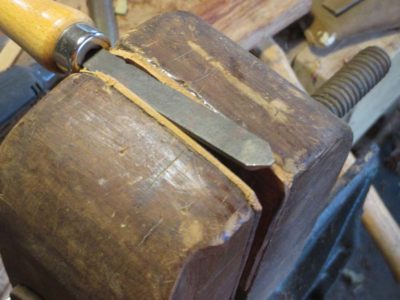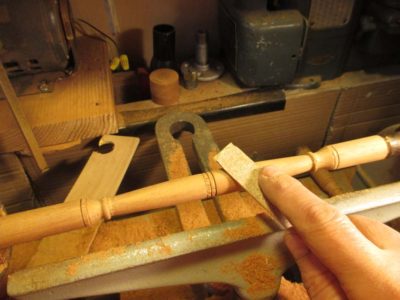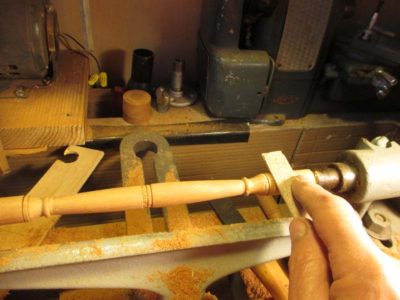Favorite Tools of the Day (for Spindle Turning)
I recently spent a day turning small-ish spindles for a project now on the home stretch. The overall length of the spindles was roughly 12″ with a maximum diameter of ~3/4″ and a minimum of ~1/2″. This was one of those times I really appreciated the four-jaw chuck I bought many moons ago as I could easily switch from square stock to round stock in a matter of moments.
Given the delicacy of the spindles, and despite the fact that I was using some excellent old-stock true mahogany, I could not hog off the material and needed to be fairly conscientious about the detailing which included several beads that were just a smidge shy of 1/8″. I had previously tried many turning chisel combinations for the effect without easy success, and even ordered a so-called 1/8″ beader made by Sorby. Though a fine tool, apparently one of us does not know how to measure 1/8″ so I just hung it back up on the rack hoping to someday have a project where I need to turn some fat 5/32″ beads.


For a brief moment I thought about re-making the tool into something more useful for this project, but instead I cast my eyes on the worthless parting tool (is that redundant?) in the rack. I do not find the spear-point parting tools to be at all useful, and certainly not this dog, so I instead I decided to turn it into the beader that I needed. So I did, with my Dremel and slipstones and a half hour. It now works exquisitely. I tried it out on a practice piece and was very pleased. You can see how Ihad aready turned some of the beads into chum by other methods.
For other detail work on these spindles I took a few surplus plow plane irons and ground and honed them into shapes that fitted my needs perfectly (including a parting tool that is worth the title). I have some additional plans for more unused plow plane irons and will document that at the time.


One final old favorite that became a treasure was the pile of tongue depressor sanding sticks I made some time ago. These are great for providing delicate shaping (using the 60-grit side) and a fine surface with the 180 grit side, keeping my fingers out of harm’s way the entire time.


Join the Conversation!